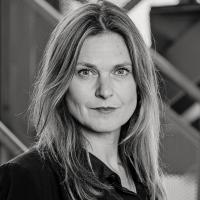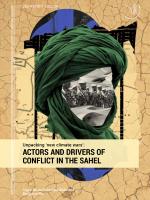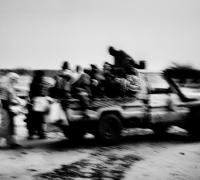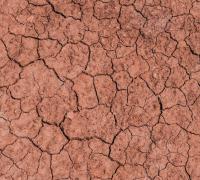Interview: Climate change and conflict in Mali
The report contributes to understanding the relationship between climate change and conflict, which is key to designing effective and adapted security, political and development responses. Finally, it highlights the need for concerted dialogue with local stakeholders and community representatives as a prerequisite for any attempt to prevent and mitigate the effects of climate change in the Sahel. In this interview, the Malian researcher and co-author, Boubacar Ba, discusses the recent dynamics in the war-affected Central Mali region and explains the role of climate change in the conflict.
Boubacar Ba is the principal researcher of the Center for the Analysis of Governance and Security in the Sahel. He has worked as an expert for UNDP on governance, security and social cohesion projects and has trained hundreds of local conflict mediators in the region of Mopti in central Mali, where he originates from.
He is the author of several books and publications such as “Justice transitionnelle et construction d'une paix durable” and “Crises de gouvernance: justice transitionnelle et paix durable au Mali” and has worked with DIIS researcher Signe Marie Cold-Ravnkilde on the new DIIS report “Unpacking ‘new climate wars’: Actors and drivers of conflict in the Sahel”.
What is the situation today in central Mali?
Central Mali is today the epicenter of the security crisis that has plagued Mali since 2012. The region links the north and the south of the country and the region has two geographic zones. To the west, there is the inner delta, the wetlands which is flooded most of the year. To the east, towards the border of Burkina Faso and Niger, you find the drylands (zones where rainfall is limited, and water is scarce).
In these geographically distinct zones, you have a mosaic of communities that live side by side and are structured around three types of production: the dominant pastoral system, the agricultural system, and the fishery system. To the east, Fulanis, who are pastoralist herders, cohabit with Dogons, who are farmers. To the west, Fulanis cohabit with Bambaras, who also depend on agriculture.
When the north was occupied by armed militias and jihadist groups in 2012 and the national army left, pastoralists joined various armed groups. These were herders who, since independence [1960], had never felt included by the Malian state. They felt victimized by the state’s development projects carried out to their detriment and thought they had suffered from stigmatization and corruption.
Recently, with the arrival of Western security operations, herders again joined armed groups as they have been mistreated by state security forces during counterterror operations. Many Fulanis have complained that they are all considered terrorists, and consequently are deprived of their basic human rights, even though only some actually join jihadist groups.
In the region, public authorities have long been faced with great difficulties in meeting the needs of the population. So, the jihadist groups succeeded in organizing themselves to expel the state and its representatives (such as the prefects, the sub-prefects, and the forestry services) to take over the governance with support from local people.
What role do climate change and the fight for natural resources play in the conflict?
Climate change is not directly linked to conflict. Climate change is linked to governance. Governance refers to the constellation of formal and informal governmental and non-governmental institutions in charge of social control, the distribution of wealth and resources and conflict resolution. These institutions should be active in the promotion of peace but, at times, they constitute a real threat to the coexistence in this area. For example, in the Mopti region, where a large pastoral area used to exist, the state initiated a system of agricultural self-sufficiency, to ensure farmers produced enough food to meet their livelihood needs. However, they did so through the occupation of pastoral land and by multiplying agricultural services to the detriment of pastoral areas. This system created conflicts between herders and farmers that were exacerbated with the arrival of jihadists.
Meanwhile, climate change still creates a reduction in resource availability which hampers food security. However, the real problem is that the state has not created balanced conditions for the use of natural resources as the example above illustrates. Today, jihadists have taken over these agricultural areas and banned the growing of crops.
To sum up, climate change does upset the ecological conditions, but they are not directly the factors of conflict. It is the bad governance, the poor application of laws and the unequal development of the agricultural and the pastoral production systems in the already existing conditions of economic inequality that have created the conflicts.
Finally, the problem of climate change is also linked to migration and especially to the reduction of the space for production during periods of drought and periods of reduced water surface.
As we speak, there are over half a million displaced and refugees in Mali. Are they climate refugees, or do people flee from something else?
There are two categories of displaced persons and refugees in this area. First, there are people who practice conventional migration. In the north and center of Mali, historically, there have always been communities on the move who have suffered from the consequences of various rebellions.
Second, for the past three or four years, many have been unable to cultivate their lands because jihadists have blocked the corridors of crops. For example, Dogon farmers are unable to work, because every time they go to the fields, they are killed by armed insurgent groups hidden around the villages. This creates food shortages and people have abandoned the area. Hence, they are displaced because of the security crisis.
But there is also a third element related to the deteriorating climatic and ecological conditions such as drought and the absence of cultivation. Now, though they are linked, we need to make the distinction between climate refugees and security refugees, even though this can be challenging. This is crucial, not least because it makes a difference in terms of the rights to protection for the displaced. Mainly, it is the security conditions that provoke displacements. At the same time, the absence of cultivation and letting agricultural areas regreen deteriorates the ecological conditions of the fields and this makes it harder for people to return. Today indeed, we are talking about five to six hundred thousand displaced in Mali.
You, yourself originate from this region of Central Mali. How does this situation affect you personally?
Watching the conflicts and the violence aggravate at this scale shocks me and I feel very sad for my country. I regret that the international community has not been able to stabilize the country after ten years of military intervention. We should have rethought this intervention, but unfortunately, the controversy between the western external forces like France and the actors in power grew too big. Secondly, I am sorry that my country has seen a serious militarization and fragmentation of communities, and to see communal conflicts between people who previously lived together peacefully. They are fighting each other with weapons that can be found everywhere
What can European actors and donors do to help resolve this situation?
Faced with this security situation, researchers note that, despite the presence of the international security actors, the situation has worsened and never really improved. Although much has been invested from various actors, the emphasis on military solutions instead of local conflict resolution has led to the failure of these efforts. In relation to local peace and ceasefire agreements that armed groups have entered, we regret to see that the external actors are engaged in a global war on terror that overshadows these other local aspects of the conflict. Furthermore, the political division in Bamako will only exacerbate communal divisions. In the end, it is the essential component of Mali, the local populations, that remain the victims. That is my bitter conclusion.
However, I am optimistic about the help of the international community. Partners such as Denmark, Norway and the EU must remember that, even though there is a disagreement with the state, the state is just one partner among others. It is necessary to go through other paths. If there is a political divergence with the state, there are still local partners like NGOs and emerging local organizations that now have the capacity to represent communities. The international partners should avoid civil society partners who try to sell illusions, and who are not legitimate or transparent. Thus, external actors need to start by making a clearer mapping to define the transparent, reliable actors of trust together with the communities they represent. Finally, you need to help local communities directly, by allowing them to access resources that will make them more resilient to the extremely difficult changing climatic, security and health conditions.
Considering the recent geopolitical developments, with France and European military actors pulling out of Mali while new actors, such as Russia repositioning themselves, the future of Mali remains uncertain. However, the arrival of Russia will not bring about the much-needed development of the country because Russia itself is entangled in problems in Ukraine and does not have the means to finance the development of Mali. I believe we will witness a series of political and social security crises in a country that is already in a state of perpetual crisis.
DIIS Experts





